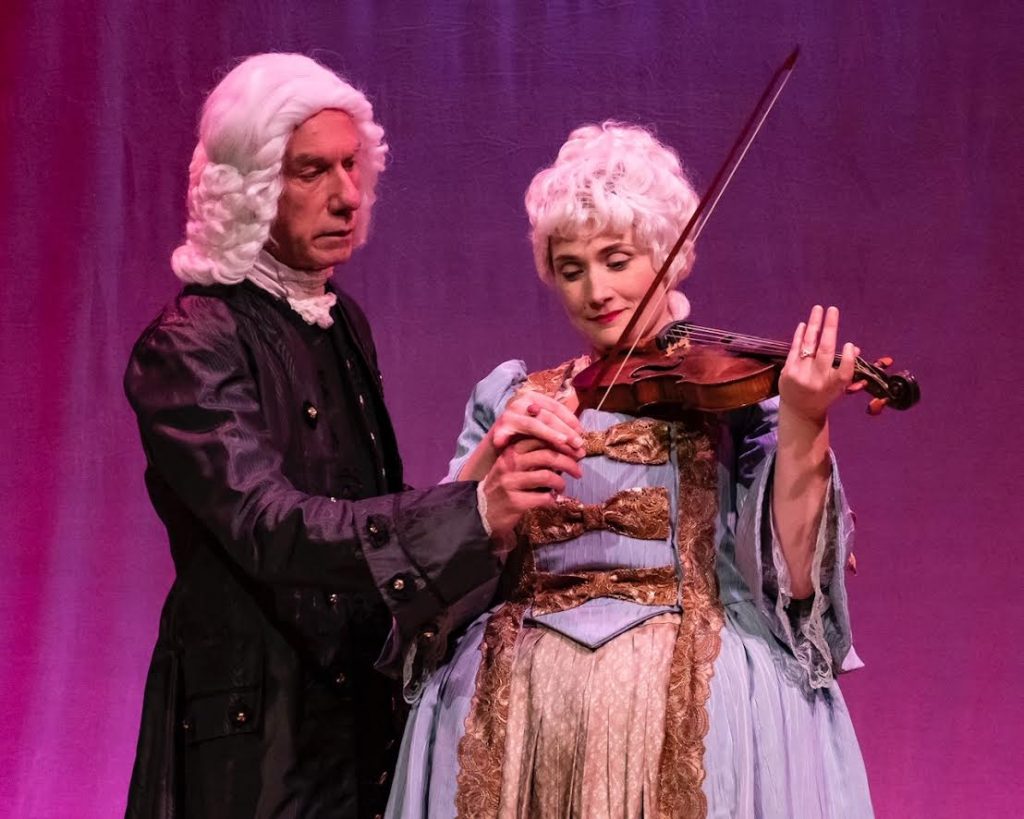
Credit: Nancy Caldwell
Jericho Arts Centre and online until December 6, 2020
Tickets from $26 at unitedplayers.com or 604-224-8007. Due to Covid 19, reservations are required for both in-theatre and online presentations
Posted November 16, 2020
What a delightful production, directed by Keltie Forsyth, of an interesting play written by Canadian actor/playwright Mieko Ouchi. And, no, my enthusiasm is not because I am starved – as are we all – for theatre but because this rather curious two-hander (plus violinist) is witty, entertaining and, eventually, comes to a poignant, thoughtful conclusion.
Ouchi looks at Antonio Vivaldi at his best-before date: the commissions are no longer pouring in, he has fallen out of favour in both Paris and Venice and is resigned to teaching violin to schoolgirls – for whom he has a creepy attraction. He’s broke. The time is the mid-18th century.

Credit: Nancy Caldwell
In the play, Vivaldi has already written The Four Seasons and seems weary of its popularity when a nobleman in the court of Louis XV hires Vivaldi to teach his much-younger wife to play the violin. She reveals that her husband has a bet on with the King and that in six short weeks she must give a violin concert. Not only is she not interested in the violin, she shows no talent.
Do not go to The Red Priest expecting a lot of Vivaldi’s music. There’s not a lot. Do go to see where obsession, passion and desire for breaking free leads.
While Jane Li’s set (elegantly lit by Jacob Wan), with its marble columns and twisting vines, is reminiscent of the formal gardens of Versailles, and Catherine E. Carr’s costumes are distinctly period (rich, beribboned brocade gown on the woman and black, silky multi-buttoned coat on Vivaldi), the sensibility of the play is very much contemporary: Vivaldi is worried that in a couple of hundred years, no one will remember him or his music; the woman, tightly constrained by her husband and by French society, longs for more in life. Her life, like her garden, is completely without spontaneity. She, like it, is supposed to be perfectly ordered.

Set design: Jane Li. Lighting design: Jacob Wan. Credit: Nancy Caldwell
Again, like the garden metaphor, the play is very mannered. Steve James and Tracy Jennissen at times move almost like pieces on the chessboard. James, when Vivaldi gets into his cups, is freer but Jennissen, tightly corseted and lavishly wigged, is almost doll-like. Slowly, however, the carefully constructed façades begin to break down. Jennissen and James are nicely matched and capture the style of Ouchi’s play beautifully. Almost by magic, the snide, cynical Vivaldi and the doll-like woman work their magic on us – and each other – and amazingly we begin to see our own fears and longings in these two circa 1740’s characters.
Apparently, the woman is sometimes played by an actor who can actually play the violin. Here, in this United Players’ production, Gizelle Rocha performs behind a scrim. Sometimes we see her; sometimes we don’t.
I like this play and this production a lot. Stylish and thought-provoking, it reminded me of Peggy Lee singing, Is That All There Is? as well as Paul Simon’s Fifty Ways to Leave Your Lover.
Winner of the Carol Bolt Award in 2004, The Red Priest (Eight Ways to Say Goodbye) reaches across three centuries to pose the question, Is this all there is? Surprisingly amusing, nevertheless.

